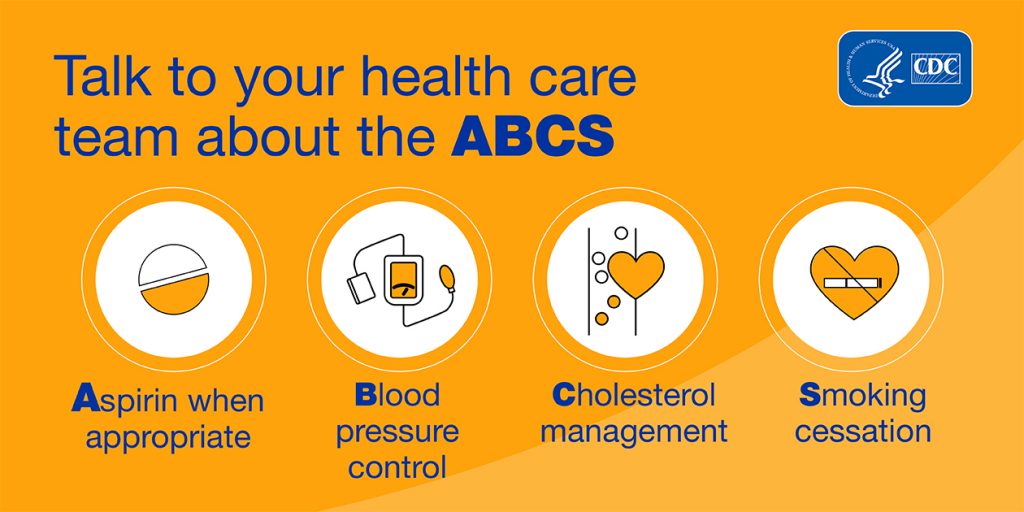American Heart Month: Knowing the ABCs of Heart Health
Each February, American Heart Month reminds residents of Arizona and all 50 states about the importance of adopting a healthier lifestyle and maintaining a healthy heart. Everything from what you eat to how you exercise has an impact on your heart, and research shows that you have a better shot at sticking to a heart-healthy routine if you share goals and accountability with others.
Just as having a healthy heart helps you lose weight, prevent disease and lower your chances of a heart attack or stroke, having an unhealthy heart puts you at a significantly higher risk of developing diseases, including COVID-19, and suffering other serious health issues. So, this month, join millions of other Americans and make heart health a top priority.
Heart Health ABCs
The “ABCs of Heart Health” are a specific set of easy-to-remember steps you can take to reduce health risks and improve heart health.

Image Credit: CDC
A: Aspirin for a Healthy Heart
Aspirin can reduce the blood’s ability to clot, which in turn may help prevent heart attacks and strokes. Before beginning an aspirin regimen for heart health, though, communicate with your doctor about your plans, your own medical history and that of others in your family.
While a low-dose aspirin therapy routine may offer notable benefits, it is not appropriate for everyone. Avoid taking aspirin daily if you are over 70, a regular drinker or are at a high risk of gastrointestinal bleeding or hemorrhagic stroke.
B: Blood Pressure Maintenance
High blood pressure, or hypertension, brings with it a wide range of health risks. Blood pressure refers to how much force your blood has when pushing against the walls of your arteries. When it is too high, it places you at an elevated risk of heart attack or stroke. In fact, high blood pressure is the single-biggest risk factor for heart attacks and strokes, so it is important that you speak with your doctor when your blood pressure spikes.
He or she may be able to recommend certain efforts or lifestyle changes that should help lower your blood pressure. These changes might include anything from quitting smoking and cutting back on sugar and carbohydrates to getting more exercise or incorporating meditation or yoga into your daily routine.
Video Credit: Heart Foundation NZ
C: Cholesterol Management
It is no secret that your cholesterol level contributes to your overall health. You may not realize, though, how much of an impact cholesterol can have on your heart. When you consume too many foods that are high in cholesterol, you run the risk of it building up in your arteries, which may be a precursor to heart disease.
There is also an important distinction between consuming “good,” or HDL cholesterol, and “bad,” or LDL cholesterol. Consuming reasonable amounts of foods high in good cholesterol, such as olive oil, chia seeds and high-fiber fruits, for example, may actually help your body protect itself against heart attacks and strokes.

S: Stop Smoking
Quitting smoking offers a wide range of benefits, including enhanced circulation and lung function. A smoking habit raises your blood pressure, and as you know, high blood pressure places you at a higher risk of a heart attack or stroke.
Quitting smoking can be difficult, but nowadays, there are an abundance of programs, apps and accountability groups you might use to make the transition easier. Speak with your doctor about other ways to break the habit and know that doing so has positive impacts on your lungs, your heart and your overall health and well-being.
The Centers for Disease Control and Prevention report that 47% of Americans have at least one of the top three risk factors that impact heart health (high blood pressure, high cholesterol and smoking). By taking steps to lower blood pressure and cholesterol, quitting smoking if you currently do so and popping a daily aspirin, you can lower your risk of heart disease and boost your chances of living a longer, healthier and more fulfilling life.






